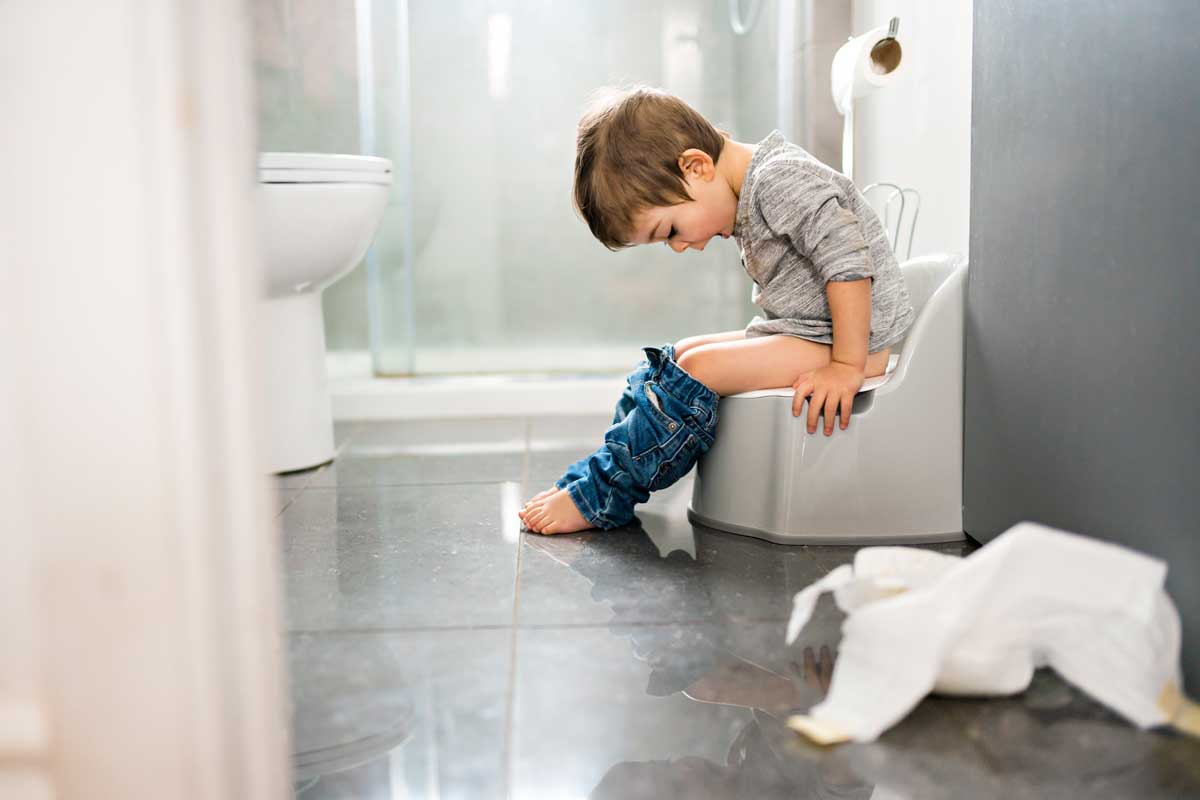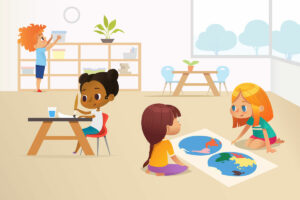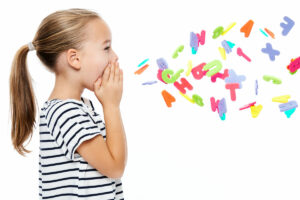You’ve made it through baby’s first year and are now gliding through age one into the beginning of toddlerhood with your sweet child. Soon enough, you’ll wake up and find yourself with a soon-to-be two-year-old looking back at you. And, the million-dollar question may already well be on your mind: ‘When is my child going to stop needing diapers?’
Potty training is a big transition in the two to three-year-old world. If you are new to this parenting gig, you may feel especially intimidated by the daunting task of convincing your child to pee and poop in a toilet. Before you get too nervous about the when/where/how of potty training, slow down, take a deep breath, and read our best advice on how to approach this all with balance, love, and at least some sanity on the other side!
1. Don’t get stuck on a specific age that you MUST begin training.
There is really no prescribed age that you must begin potty training your child. Sure, that summer program may want your child to be toilet trained before they can join in the fun, but you can also find activities for your child where they totally don’t mind diapers (Ex: Kid’s Corner at the YMCA of the Fox Cities). The more you stress about doing this at a specific, preordained time, the more likely you are to have struggles. Bowel and bladder training is a developmental milestone. Just like every baby walks on their own timeline, every toddler potty-trains on their own timeline. This is NORMAL. Don’t let yourself lose your peace in this!
2. Be smart about when you choose to begin.
In that same vein, once your child begins to show interest in potty training (sitting on the potty, talking about others on the potty, telling you when they pee or poop, etc.), there are a few other things to keep in mind before you jump in head first! Consider whether you and your family are in a good place for starting toilet training. Don’t begin potty-training with a brand-new baby, a new job, while on vacation, upon beginning the school year, when the household is sick, while weaning from nursing…you get the picture. There is no reason to torture yourself and frustrate your child! Wait for a season for where you all can manage this added project.
3. You can use rewards as a tool to help motivate your child.
Children learn early on the joy of earning a reward. This can be really helpful when positively paired with potty training. Here are some ideas for motivational tools:
- Stickers
- Toy basket (pick a new toy for each time they pee or poop on the potty): Put the toys back at the end of the day and start over the next day.
- Healthy drinks/snacks: Many a parent has motivated a child to toilet train using treats as motivators. If this makes you hesitate, you could try a healthy drink or snack instead. But, if you totally don’t want to link food consumption and rewards, try another idea.
- Elmo’s Potty Time or favorite show: This serves as a reward and possibly a motivator? You might need earplugs after a few days.
- Extra book or cuddle with mom or dad: You can never go wrong with this or some special praise!
- Big kid underwear: This actually does help sometimes. My girls were super interested when the next baby arrived, and they wanted to wear ‘Big Sister’ underwear.
4. Potty training in seasonable weather and without pants is often easier.
You are probably going to have a handful of messes on your hands, at least early on in the process, when you begin to potty-train your child. Think about how you want to handle this. Some parents just section off a portion of their home (with baby gates) and stay camped out there during the intensive days of training. That is definitely one option. I have found that waiting for a season where you can be outdoors in the backyard, is actually pretty ideal. If your child has a whoopsie, the ground will absorb the mess. You can bring a potty chair right outside for them to use as needed. Consider dressing your child in an oversized long shirt or dress and going bottomless. The added sensory feedback of feeling him/herself wetting and pee dripping down legs is often enough to encourage your child to scoot along quickly to the potty. You can also use this underwear/pant-free method inside your home (provided you feel comfortable dealing with the potential floor messes. Tip: roll up floor rugs if you choose this route!).
5. Your child may have a fear of pooping on the potty.
Many kids just feel a lot more vulnerable when it comes to pooping on the potty. I mean, it makes sense. The sensation of pooping in a diaper versus into a potty is totally different and foreign than what they’ve done their whole life! You might have to spend some time working up to this one. Make sure to start with a potty chair for kids that are really nervous. It is smaller and less intimidating. Sometimes little kids feel really unsteady and ungrounded on a big toilet even with a special seat and footstool. Plus, sitting with knees bent on the ground is a much better physical position for a successful poop.
6. Nighttime training frequently comes waaay after daytime toilet training.
Again, nighttime bowel and bladder control is a developmental milestone. Your child might ace daytime potty training at two and a half but then continue to need nighttime diapers for a few years beyond this. That being said, if you begin to sense that your child wants to try nighttime toilet training or is truly ready here are a few tools that might help you!
- Chux (or piddle) pads: These can be super helpful for a child who’s nervous of wetting or who may wet just a small amount. Easy to change out quickly at night.
- Alarms: They do make bed-wetting alarms, and these can work well for some kids. The sensor alerts the child when their underwear are getting wet. The fancy word for this mechanism is biofeedback. These may not be for your child if they are already feeling anxious about the whole process.
- Restricting pre-bedtime liquids: May be obvious, but this can be a big help. Also keep nighttime liquids to a minimum.
- Double layered bedsheets: Waterproof mattress cover, fitted bedsheet, 2nd waterproof mattress cover, and 2nd fitted bedsheet. Makes a dead of night clean up MUCH easier.
- Potty chair: Some kids are afraid to make a trip down the hallway to the bathroom (or don’t want to have to walk that far in the middle of the night!). Consider a temporary solution of a potty chair at their bedside to encourage a starting point.
7. Expect regressions, especially during big life transitions.
This is pretty straightforward, but, yes, you can expect your child to regress from time to time and have accidents. This is totally normal. Don’t sweat this too much! It doesn’t last forever. Regressions are especially common during big transitions, ex: starting school, welcoming a new baby into the family, a move, or a new bed—just like with a baby that begins to wake at night again during a developmental leap. That’s okay! You will get back to making progress again soon.
8. Shift your thinking about the burden of the expense of diapers.
If a good friend was in need, you wouldn’t bat an eye to offer a meal or pick up an essential item at the store for this person that you love. If you shift your thinking about your child’s need for diapers as an act of charity toward your child, it can be a lot easier to stomach the ongoing expense of diapers. It may sound crazy, but if it helps you accept the extra expense, think of the diapers as a ‘donation’. And if you do budgets, you can even throw the diaper expense in with your charitable giving. Remember, your toddlers aren’t intentionally causing you headaches here. If it helps you to approach your child’s toilet training with more patience and compassion, then we think this simple mind shift can be a game-changer.
9. If you’re not in a good place to approach this with patience & love—wait.
Potty training is yet another big project where you and your child have to come together to accomplish a goal. As a parent of a young child, you are laying the groundwork for developing a secure parent-child relationship, one based on trust. It’s okay to admit if you are just not in a good place to toilet train. Who cares what your friends or neighbors are doing! Your child and a good relationship with that child are worth waiting for. Similarly, if you find yourself getting too frustrated in the midst of potty training, take a step back and a deep breath. Ask yourself, ‘why am I feeling this way?’, ‘Why am I so set on this happening right now?’ We all have our own emotional cobwebs to comb through. Sometimes, you need to address some of your own hang-ups first before you can successfully start the project of potty training your child.
10. Your child will learn to use the toilet.
And a final word of encouragement for you–yes, your child will one day learn to use the toilet! There will come a day when this stage will be long gone, and you will have made it through these dark waters! You can do this. You are a great parent! Hang on and enjoy the ride together with your little person. These precious moments are but a drop in the bucket of the rest of your life together.








